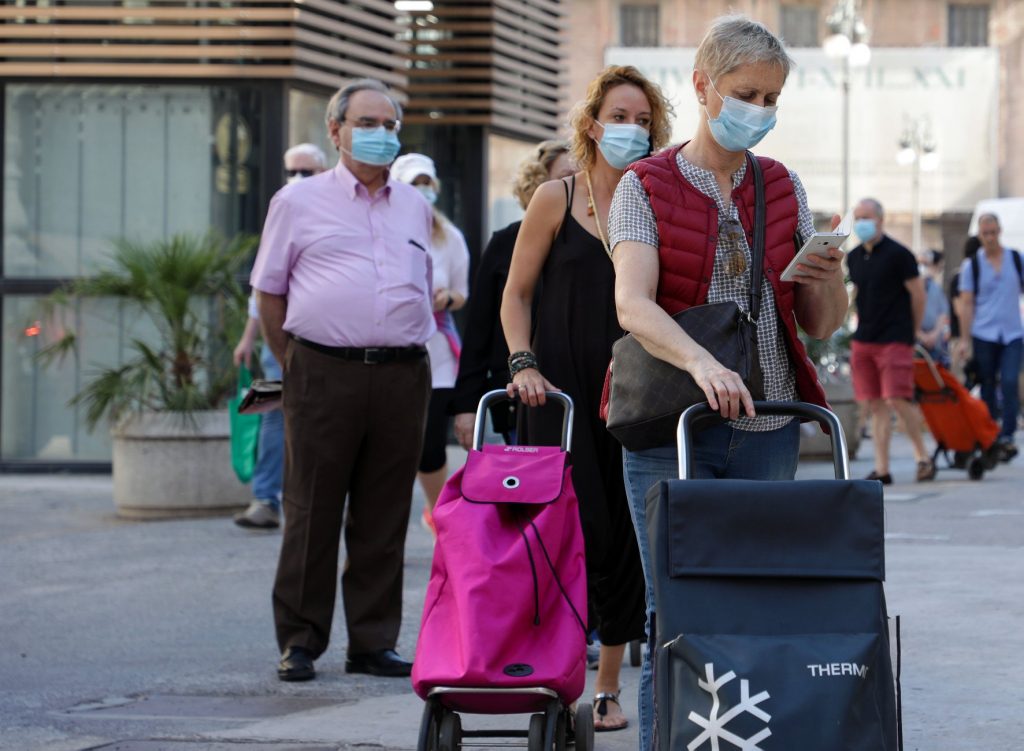It’s official: Face masks don’t have to be worn outdoors from June 26th – but there are conditions
Royal Decree-Law 13/2021 has modified the rules on the mandatory wearing of face masks outdoors – although everyone will still be obliged to carry one with them at all times.

PHOTO CREDIT: Facebook - Generalitat Valenciana
Friday 25th June 2021 – Compiled by MIKE SMITH
It’s official. From Saturday 26th June, face masks will not have to be worn outdoors if social distancing can be maintained (a minimum of 1.5 metres) although it will be mandatory for everyone to carry a face covering at all times so that it can be put on in situations that require them to be worn, such as moving to indoor spaces, on public transport, and in the open air in crowded streets or large events where social distancing cannot be guaranteed.
Royal Decree-Law 13/2021, published on June 24th in the document BOE-A-2021-10585, modified the rules detailed in Law 2/2021 of March 29th, which dealt with the mandatory use of face mass on public roads and in outdoor spaces.
The decision has been taken based on the evolution of the COVID-19 epidemic in the different regions of Spain and the increasing coverage that is being achieved with the vaccination campaign, with over 57% of the population having received at least one dose of vaccine (up to June 24th), which has raised the option for reducing the mandatory use of face masks in certain environments and scenarios.
BOE-A-2021-10585 has confirmed the following modifications to Law 2/2021, Article 6:
Article 6. Mandatory Use of Masks
- People six years of age and older must wear face masks in the following situations:
a) In any closed space for public use or open to the public.
b) In any outdoor space in which it is not possible to maintain a minimum distance of 1.5 metres due to the crowding of people, except for those who live together.
c) On air, sea, bus or rail transport, including platforms and stations, cable cars, complementary public and private transport up to nine seats (including the driver) if the occupants of the private vehicles don’t live at the same address. For ship and boat passengers, masks will not be necessary when inside their cabin or in exterior spaces where the minimum safety distance of 1.5 metres can be maintained.
d) In large outdoor events, when attendees are standing or if they are seated when the 1.5 metre minimum safety distance cannot be maintained, except for those who live together at the same address. - The obligation contained in the previous section will not be enforceable in the following situations:
a) People who have some type of illness or respiratory difficulty which may be aggravated by the use of the mask or who, due to their disability or dependency, don’t have the autonomy to remove the mask, or who have behaviour issues which make its use unfeasible.
b) In the event that, due to the very nature of the activity, the use of a face mask is incompatible, in accordance with the indications of the health authorities.
c) In places or closed spaces for public that are part of the place of residence of the groups that meet there, such as institutions for the care of the elderly or people with disability, the units for the collective residence of essential workers or other similar groups as long as said groups and workers who perform their duties in those units have vaccination coverage against SARS-Cov-2 greater that 80% completed, accredited by the competent health authority. This doesn’t epply to external visitors or workers in residential centres for the elderly or disabled. - The use of masks in prisons where there is movement of inmates, both outdoors and in closed spaces, will be governed by specific rules established by the competent prison authority.
- The unit sale of surgical masks that are not individually packaged make only be carried out by pharmacies, guaranteeing adequate hygiene conditions that safeguard the quality of the product.
Whilst the use of a face mask is being eased in outdoor spaces, it is important that a mask is carried by every person in case of situations where social distancing cannot be maintained and for when the person enters an enclosed or indoor space where the wearing of a face mask is mandatory, such as inside bars and restaurants, supermarkets, etc.
Experts have called on the national health authority to periodically review and modify rules of the wearing of face masks to respond to the spread of the virus, the progress of the vaccination campaign, and the pressure of hospitals and ICU wards.
Drop in the rate of the spread of the virus stalls
The latest figures published by the Government shows that the rate of the spread of the virus in Spain (the IA rate measured in terms of the number of positive cases per 100,000 inhabitants over a 14 week period) has stalled after over two months of progressive decline from its peak during the fourth wave of infections.
The national IA rate now stands at 93.19, up just over 1% over the past few days, but the rate is some 16% lower than it was two weeks ago. Andalusia still leads the way nationally (166.50) but remains the only autonomous region in the ‘High Risk’ category. The Comunidad Valenciana has seen its rate climb slowly during the month, from 39.19 on June 15th to 47.10 on June 23rd, but the region remains in the ‘Low Risk’ category.
Due to the Sant Joan holiday, there is no update for the Marina Alta at this time.



